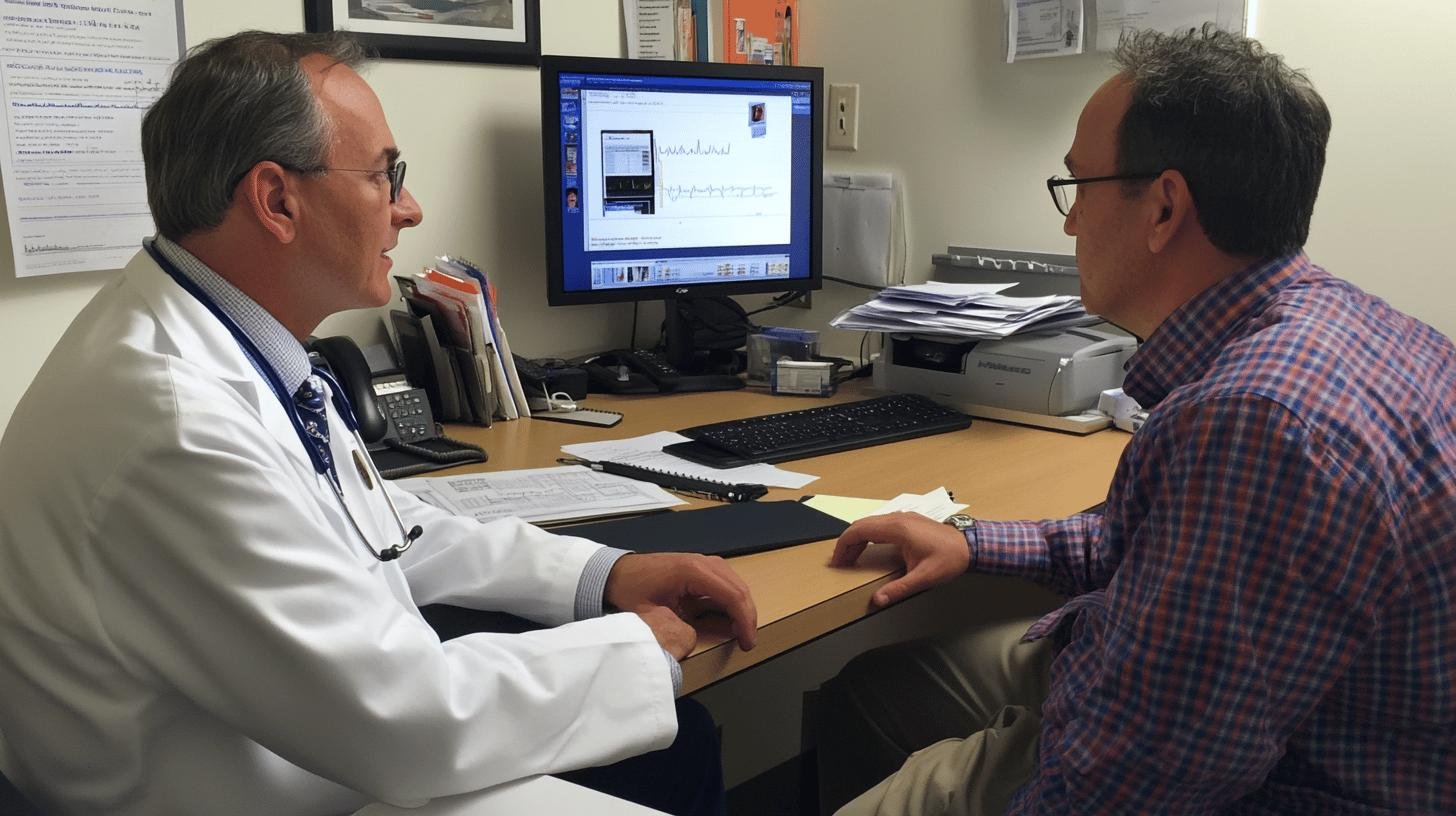TL;DR:
- Direct Primary Care (DPC) is a model where patients pay a monthly or annual fee directly to doctors.
- DPC clinics limit patient numbers to around 600 per doctor, improving personalized care.
- Benefits include longer appointment times, same-day appointments, and direct communication with doctors.
- Typical DPC membership costs range from $50 to $150 per month, covering various primary care services.
- DPC services include preventative care, chronic disease management, minor urgent care, lab tests, imaging, and minor procedures.
- Patients report better health outcomes, high satisfaction, and stronger doctor-patient relationships.
Ever feel like you’re just another number in a crowded waiting room? Let’s flip the script on that scenario. Welcome to Direct Primary Care (DPC) clinics, where personalized and accessible healthcare is the name of the game. Imagine having a doctor who actually remembers your name and offers same-day appointments. Ready to experience healthcare that focuses on you? Dive into our guide to learn how DPC clinics can change how you see your health—and your doctor.
Sure, I can help with that. Here’s the edited and enhanced version of your blog post:
What is a DPC Clinic?
Direct Primary Care (DPC) is a healthcare model in which patients pay a monthly or annual fee directly to their primary care provider. This eliminates the need for insurance billing, creating a more personalized and accessible form of care. By cutting out the middleman, DPC clinics focus on what matters—your health.
Typically, DPC practices limit their patient load to around 600 patients per doctor. In contrast, traditional practices handle about 2,500 patients per doctor. This lower patient count means more time and attention for each individual.
DPC clinics operate pretty differently from traditional healthcare practices. Without insurance constraints, doctors can offer longer and more flexible appointments. This model allows for direct communication via phone, email, or text, making it easier for you to get the care you need when you need it. No more dealing with insurance companies or waiting weeks for an appointment.
- Monthly or annual fees
- No insurance billing
- Limited patient numbers
- Enhanced doctor-patient relationships
- Same-day or next-day appointments
The benefits are numerous. Patients enjoy more personalized care, better access to their doctors, and overall improved health outcomes. The direct payment structure encourages proactive wellness planning; co-pays or visit caps do not restrict you. It’s a healthcare solution that puts you, the patient, first.
Benefits of Joining a DPC Clinic

Let’s discuss the general perks of Direct Primary Care (DPC) clinics. DPCs offer longer appointment times, so you won’t feel rushed during your visit. You also get direct access to your doctor via phone, email, and even text. This is a game-changer for those “quick question” moments. Many patients report better health outcomes and higher satisfaction levels. Who wouldn’t want that?
Improved access is another major benefit. Have you ever tried booking an appointment and been told the next available slot is weeks away? With DPC, same-day or next-day appointments are the norm. Imagine having a doctor who knows your name, your health history, and even your dog’s name. The patient-doctor relationship gets a major upgrade. This level of access makes it easier to manage chronic conditions and catch issues early.
What about cost-effectiveness? DPC can be super cost-effective, especially if you have a high-deductible plan or no insurance. You’re paying a flat monthly or annual fee covering many services. No more surprise bills or hidden costs. Some clinics even offer discounts on lab tests and medications, making your healthcare budget-friendly. It’s like having a Netflix subscription but for your health.
Better health outcomes are also a key benefit. When you’re not stressed about the cost or rushing through appointments, you tend to take better care of yourself. DPC clinics focus on preventive care and wellness planning, which means fewer emergency room visits and hospital stays. Patients often feel more empowered and involved in their healthcare decisions, leading to healthier lifestyles overall.
| Benefit | Details |
|————————|————————————————————————-|
| Longer Appointment Times | More personalized and thorough care |
| Direct Access to Doctors | Communicate via phone, email, or text |
| Cost-Effective | Flat fees cover a wide range of services, reducing unexpected costs |
DPC Services: What to Expect
In a Direct Primary Care (DPC) clinic, you can expect a wide range of services catering to your overall health. These clinics focus on preventative care, offering regular checkups, screenings, and wellness advice to keep you in top shape. Chronic disease management is another key service, providing ongoing support and treatment plans for conditions like diabetes or hypertension. Minor urgent care is also covered, so unexpected illnesses or minor injuries can be handled quickly and efficiently.
DPC clinics often include additional services such as lab tests, imaging, and minor procedures. These services can be included in your membership fee or available at a reduced cost. Imagine not having to deal with insurance claims for a simple blood test or X-ray. It’s all streamlined to make your healthcare experience as smooth as possible.
- Preventative care
- Chronic disease management
- Minor urgent care
- Lab tests
- Imaging
- Minor procedures
The value of these services cannot be overstated. By offering a wide range of care options under one roof, DPC clinics make it easier to stay on top of your health. You get personalized attention and comprehensive care without the typical barriers experienced in traditional healthcare settings. It’s a holistic approach focused on keeping you well rather than just treating you when you’re sick.
Comparing DPC Clinics with Traditional Healthcare Models

First, let’s talk about billing and administrative overhead. Traditional healthcare often involves a ton of insurance billing, creating extra paperwork, and administrative tasks. This takes time away from actual patient care. In DPC clinics, you pay your doctor directly through a monthly or annual fee. No insurance billing means less administrative hassle and more focus on you. Endless forms don’t bog down your doctor and can spend more time on your health.
Now, let’s chat about appointment times and doctor-patient relationships. In traditional healthcare, appointment times are usually short—like, really short. You might feel rushed, and covering all your concerns in one visit can be tough. DPC clinics flip this script. You get longer appointments, so you can discuss everything you need. Plus, the doctor-patient relationship receives a huge boost. With fewer patients to see, your doctor can know you better and offer personalized care.
- Insurance billing vs. direct payments
- Administrative overhead
- Appointment duration
- Patient load per doctor
- Access to doctors
So, what makes DPC often considered better? It boils down to the quality of care. Without the red tape of insurance, doctors in DPC clinics can focus on preventive care and wellness planning. You’re not just another number in a crowded waiting room. Instead, you get a healthcare experience that’s tailored to you. The direct payment model encourages transparency and trust, improving overall health outcomes.
It’s clear: DPC clinics offer a more personalized, accessible, and adequate healthcare solution.
How to Find and Join a DPC Clinic
In case you are wondering how to find a DPC clinic near you? Start by searching online directories or asking around in your community. Websites dedicated to listing DPC clinics can help you find one in your area. Word of mouth is another powerful tool—ask friends, family, or colleagues if they know of any DPC clinics nearby. You’d be surprised how many people are switching to this healthcare model and can give you a solid recommendation.
Once you’ve found a DPC clinic you’re interested in, onboarding is usually a breeze. Typically, you’ll meet with the clinic staff to go over their services, pricing structure, and how to access care. This initial meeting is your chance to ask questions and see if the clinic fits you. The staff will explain how the fees work, what services are included, and any additional costs. You’ll learn to schedule appointments, whether same-day or next-day and communicate directly with your doctor.
Joining a DPC clinic is straightforward and stress-free. Unlike traditional healthcare models, there are no complicated forms to fill out or insurance approvals to wait for. Once you decide to join, you simply sign up and pay your membership fee, and you’re good to go. It’s all about making healthcare accessible and easy for you.
DPC Clinic Pricing and Membership Plans

Let’s talk about the costs of Direct Primary Care (DPC) memberships. Generally, you’re looking at $50 to $150 per month. This fee covers various primary care services, making it a steal compared to traditional healthcare costs. The pricing may vary depending on your location and the clinic’s specific services. Some clinics even include extra services like lab tests and minor procedures at no additional cost. It’s a pretty sweet deal, right?
Now, what affects these costs? Location is a significant factor. Clinics in urban areas might charge more than those in rural settings. The range of services provided also impacts the price. A clinic offering more comprehensive services will typically charge a higher fee. Additionally, some clinics have different membership tiers, so you can pick a plan that best suits your needs and budget.
- Basic membership
- Family plans
- Corporate plans
- Senior plans
- Additional services
So, what’s the value of these memberships? The flat fee structure simplifies budgeting for healthcare. You know precisely what you’re paying monthly, with no surprise bills. Family plans can cover multiple members, making it more affordable for everyone. Corporate plans offer businesses a way to provide healthcare benefits without the headaches of traditional insurance. Senior plans cater to older adults who need more frequent medical attention. Overall, DPC memberships offer a transparent, cost-effective way to manage your healthcare needs.
Real Patient Experiences in DPC Clinics
Let’s examine what patients say about Direct Primary Care (DPC) clinics. Patient testimonials often highlight the incredible improvements in doctor-patient relationships. People rave about how their doctors take the time to listen and understand their concerns. This isn’t just a one-off; it’s a common experience many DPC patients share.
In these testimonials, several themes come up repeatedly. Improved health outcomes are significant—patients feel healthier and more in control of their well-being. High satisfaction levels are another frequent mention. Patients love their direct access to their doctors via phone, email, or text. This access makes it easier to manage chronic conditions and stay on top of preventive care. Many families find that DPC clinics offer a more cohesive and personalized healthcare experience, making caring for everyone, from kids to grandparents, easier.
- Personalized care
- Improved health outcomes
- High satisfaction
- Direct access to doctors
Final Words
Exploring a DPC clinic reveals a healthcare model that’s all about you. You eliminate insurance hassles, enjoy personalized attention, and build stronger relationships with your doctor.
Joining a DPC clinic means better access, cost-effectiveness, and improved health outcomes—all wrapped up in a straightforward pricing plan.
Ready to simplify and personalize healthcare? A DPC clinic might be the perfect fit for you and your family. Here’s to healthier days ahead!
FAQ
What does DPC stand for in medical terms?
In medical terms, DPC stands for Direct Primary Care. It refers to a healthcare model where patients pay a monthly or annual fee directly to their primary care provider.
Is direct primary care the same as concierge medicine?
No. Direct primary care (DPC) is not the same as concierge medicine. Both offer direct access to doctors, but DPC doesn’t involve insurance, whereas concierge medicine often charges a retainer fee in addition to insurance.
What is DPCS in healthcare?
DPCS in healthcare typically stands for Direct Primary Care Services. It focuses on providing comprehensive primary care through a membership model, bypassing traditional insurance billing.
How much does a DPC membership cost?
Direct Primary Care memberships generally cost between $50 and $150 per month, but pricing can vary depending on location and the services offered.
What are the pros and cons of Direct Primary Care?
Pros:
- Personalized care
- Longer appointment times
- No insurance hassle
Cons:
- Membership fee
- It may not be covered by insurance
What is the DPC Mapper?
DPC Mapper is an online tool for finding direct primary care clinics near you. It provides a map of DPC practices, making it easier to locate a clinic nearby.
What is the DPC Alliance?
The DPC Alliance is an organization that supports the Direct Primary Care movement, providing resources and advocacy for DPC practices and patients.
How do DPC clinics work?
DPC clinics operate on a membership model. Patients pay a regular fee for comprehensive primary care services, eliminating the need for insurance billing. This allows for more personalized and accessible healthcare.

